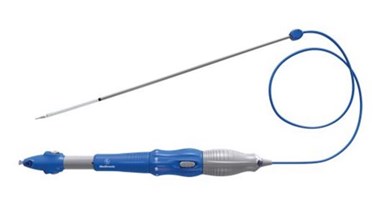FDA Clears Medtronic's Recapturable, Repositionable TAVR

Medtronic has announced that its Evolut R transcatheter aortic valve replacement (TAVR) system has been cleared by the U.S. Food and Drug Administration (FDA). This is the second big U.S. win for Medtronic TAVR systems — CoreValve was approved last year — and this newest innovation is the first recapturable and repositionable TAVR system offered in the U.S.
TAVR technology was developed as a non-invasive valve replacement alternative for high-risk patients deemed too sick to undergo open heart surgery. In March, a promising clinical analysis published in JAMA indicated strong one-year outcomes for patients undergoing the procedure, and it provided much-needed long-term data to support continued development of the technology.
“In a short time, the TAVR procedure has become an established treatment option for high-risk patients with severe aortic stenosis who are unable to undergo surgery, and physicians are looking to technology advancements to help deliver even better patient outcomes,” said Mathew Williams, co-primary investigator of the study and chief of adult cardiac surgery at the NYU Langone Medical Center, in a Medtronic press release.
Last year, Medtronic announced the approval of another TAVR system, CoreValve, which provides multiple sizes of self-expanding valves that are the smallest available on the market and ideal for patients with exceptionally small vasculature. The CoreValve system already has been implanted into more than 75,000 patients in 60 countries.
The Evolut R system, said Medtronic, builds on knowledge gained in the development of CoreValve to innovate a TAVR system that is even more versatile and is optimized to increase conformability and sealing at the annulus. But the most notable feature in the new design is that it can be recaptured and repositioned during the implantation procedure, if necessary.
Omar Ishrak, CEO of Medtronic, told CNBC that this new feature would make the procedure “much easier and safer.” Ishrak said he expected the device to achieve much better outcomes as a result.
“This feature can avoid the costly error of deploying a second device and reduces complications from mal-positioned devices,” said Evercore ISI analysts in a note quoted by Reuters.
The Mayo Clinic estimates that nearly one-third of patients requiring an aortic valve replacement are not candidates for open heart surgery, due either to age or to comorbid conditions. Already, TAVR technology has proven itself as a viable option for these patients, and some experts are investigating whether or not TAVR could be a suitable option for lower-risk patients.
Rhonda Robb, V.P. and G.M. of heart valve therapies at Medtronic, commented in a press release that the Evolut R system has ushered in a new era of TAVR options.
“This approval is an outcome of our commitment to building a market-leading innovation pipeline in the transcatheter space,” said Robb. “We look forward to supporting heart teams as they look to next generation technologies that optimize valve performance for a broad range of patients.”
